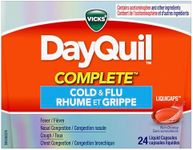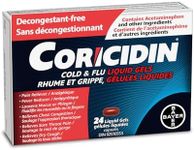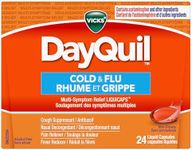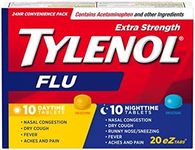Buying Guide for the Best Cold And Flu Medicines
Choosing the right cold and flu medicine can make a big difference in how comfortable you feel while you recover. Since symptoms can vary from person to person and from one illness to another, it's important to match the medicine to your specific needs. Always read labels carefully, consider your symptoms, and be aware of any allergies or health conditions you have. If you take other medications or have chronic health issues, it's wise to consult a healthcare professional before starting a new medicine.Symptom ReliefCold and flu medicines are often designed to target specific symptoms such as congestion, cough, fever, sore throat, or body aches. It's important to identify which symptoms are bothering you the most and choose a medicine that addresses those. For example, if you mainly have a runny nose and sneezing, an antihistamine might help, while a cough suppressant is better for a persistent cough. Avoid multi-symptom formulas if you only have one or two symptoms, as you may be taking unnecessary ingredients.
Active IngredientsThe active ingredients are the chemicals in the medicine that actually treat your symptoms. Common ones include acetaminophen or ibuprofen for pain and fever, dextromethorphan for cough, and pseudoephedrine or phenylephrine for congestion. It's important to check these so you don't accidentally take too much of one ingredient if you use more than one product. If you have health conditions like high blood pressure, some ingredients (like decongestants) may not be safe for you.
Formulation TypeCold and flu medicines come in various forms such as tablets, capsules, liquids, powders, and dissolvable strips. The right choice depends on your preference and any swallowing difficulties. Liquids are often easier for children or those who have trouble swallowing pills, while tablets and capsules are convenient for adults on the go. Powders and strips can be handy if you want something that works quickly or is easy to take without water.
Daytime vs. Nighttime FormulasSome medicines are labeled for daytime or nighttime use. Nighttime formulas often contain ingredients that can make you drowsy, helping you sleep, while daytime versions avoid these so you can stay alert. Choose a nighttime formula if your symptoms are keeping you from resting, but stick to daytime options if you need to remain active and focused.
Duration of ActionThis refers to how long the medicine works before you need another dose. Some products are short-acting and need to be taken every 4-6 hours, while others are long-acting and last 12-24 hours. If you want relief overnight or throughout a workday, a longer-acting formula may be more convenient. However, always follow dosing instructions to avoid taking too much.
Sugar and Alcohol ContentSome liquid medicines contain sugar or alcohol, which may not be suitable for everyone. If you have diabetes or avoid alcohol for personal or health reasons, look for sugar-free or alcohol-free versions. These are widely available and clearly labeled.
















